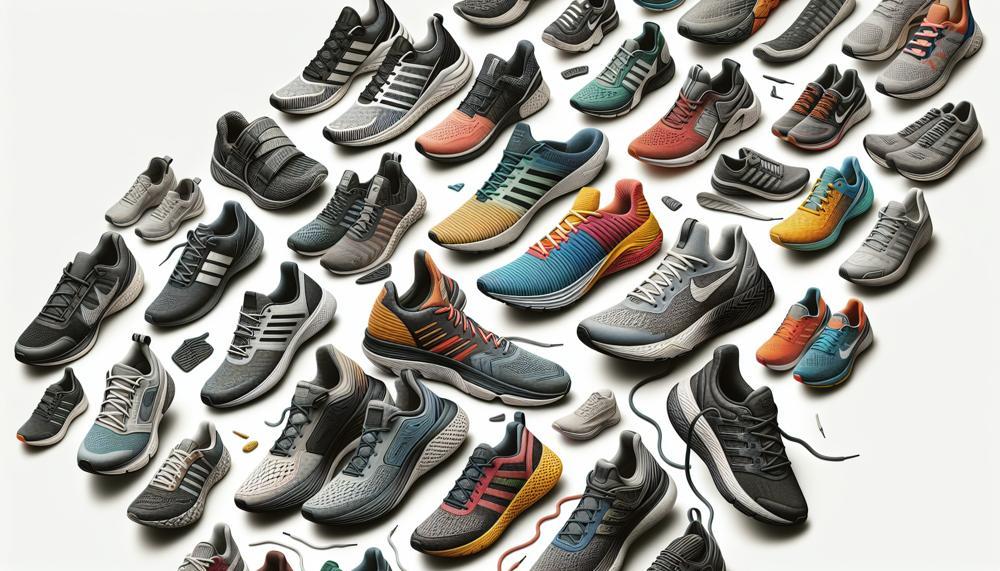When it comes to finding the perfect running shoe, the options can feel overwhelming. But two brands that consistently rise to the top are ASICS and Brooks. With a strong presence in the running community and a wide range of high-quality shoes, these companies have earned their reputation.
But when it comes down to it, which brand reigns supreme? In this blog post, we will delve into a detailed comparison between ASICS and Brooks to help you make an informed decision for your next pair of running shoes.
From comfort and durability to design and technology, we’ll explore all the important aspects of each brand so you can determine which one suits your needs best. So let’s lace up our sneakers and dive into this ultimate showdown between ASICS and Brooks.
Here are the key points we will cover:
- Company history and background
- Key features and technologies
- Price range
- Target audience
- Pros and cons
A Quick History of Two Famous Shoe Brands
Contents
ASICS Corporation and Brooks are two renowned shoe brands that have achieved global success. Each brand has a rich history of providing top-quality footwear for athletes, with their unique design and technology approaches.
The formation of ASICS Corporation in 1977 marked the merger of three companies. However, its roots date back over one hundred years. Its founder, Kihachiro Onitsuka, had a vision to promote “sound mind and sound body” in post-war Japan. Today, ASICS is famous for its exceptional running and athletic shoes, including the iconic Gel Lyte sneaker.
On the other hand, Brooks was founded in 1914, with a sole focus on designing running shoes. They have gained recognition for their scientifically-driven approach and have been approved by the American Podiatric Medical Association (APMA). Their shoes are known for their wider toe box and innovative DNA technology for cushioning.
Both ASICS and Brooks have solidified their position as top shoe brands through their constant innovation and ability to cater to various sports codes. They have also stayed relevant in the ever-changing market by adapting to new technologies and trends. Their commitment to promoting a healthy lifestyle has earned them a loyal following among athletes worldwide.
Despite being competitors, both brands share the same goal – to provide high-quality shoes that enhance athletic performance and promote overall well-being. Their dedication to excellence has made them household names in the world of sports footwear, with a winning combination of style, functionality, and comfort.
Which Shoe Brand is Best for Road Running
When it comes to road running, there are two popular shoe brands that stand out: ASICS and Brooks. However, despite their similarities, these brands have distinct differences that can significantly impact a runner’s overall experience and performance.
Let’s examine the main differences between these two brands and see which one is best suited for you.
| ASICS | Brooks |
| Snug fit, particularly in the midfoot and heel area | Great overall fit for various foot shapes and sizes |
| Narrow shoes compared to Brooks | Wider shoes compared to ASICS |
| Uses classic medial post design for stability | Moved away from traditional support methods in favor of adaptive cushioning technology |
| Features Gel technology for cushioning | Utilizes DNA LOFT midsole with adaptive cushioning technology |
Fit is a crucial aspect when choosing the right running shoe. ASICS is known for its snug fit, especially in the midfoot and heel area. This provides a secure and comfortable feel while running, making it a preferred choice for some runners. On the other hand, Brooks offers a great overall fit, catering to a wider range of foot shapes and sizes.
In terms of stability, ASICS uses a classic medial post design in their stability shoes, which is a common method used by many shoe brands. But Brooks has taken a different approach by using adaptive cushioning technology with their DNA LOFT midsole. This provides a more personalized support system that adapts to each runner’s unique needs.
One of the significant differences between these two brands is their cushioning technology. ASICS is known for its Gel technology, which offers excellent shock absorption and cushioning for road runners. In contrast, Brooks uses their proprietary DNA LOFT midsole, which adjusts to a runner’s stride and delivers customized cushioning.
It’s also worth mentioning that ASICS shoes tend to be narrower compared to Brooks shoes. This may be a crucial factor for some runners, as a proper fit is essential for comfort and performance.
Trail Running: Brooks vs Asics
When it comes to hitting the trails, Brooks and ASICS have their own unique offerings for runners.
These two brands have distinct features and technologies that cater to different terrains and runner preferences. Here are some key differences between the two:

- Focus: Brooks and ASICS are both known for their running shoes, but Brooks exclusively designs shoes for runners while ASICS produces shoes for a variety of sports. This means that Brooks may have a more focused approach to running technology, while ASICS may have a broader focus.
- Technology: Brooks prides itself on being science-driven in their shoe design, utilizing advanced technology to accommodate a runner’s gait and biomechanics. However, ASICS relies on GEL cushioning technology for improved shock absorption and cushioning.
- Fit: The fit of a trail running shoe is crucial to its performance. Brooks typically has a wider toe box compared to ASICS, making them a better option for runners with wider feet or foot issues. On the other hand, ASICS offers a snugger overall fit for more control and support.
- Materials: The materials used for cushioning also differ between the two brands. Brooks uses various foam materials, while ASICS relies on their GEL technology.
- Stability: Both brands offer stability options for runners who need extra support and pronation control. Brooks uses their patented GuideRails system, while ASICS utilizes traditional stability methods.
Brooks vs Asics on Values
In the competitive running shoe industry, both Brooks and Asics have established themselves as reputable brands. With a strong emphasis on quality, innovation, and customer satisfaction, they have won the hearts of many runners. However, when it comes to their core values, there are some key differences between the two brands.
Brooks is renowned for its unwavering commitment to providing runners with the perfect fit and ultimate comfort. Their core values revolve around creating high-quality, durable shoes that cater to the unique needs of each individual runner. They also prioritize customer feedback and use it to continuously improve their products.
On the other hand, Asics places a strong emphasis on technology and innovation. Their core values revolve around incorporating the latest advancements in shoe technology to enhance performance and address specific needs of athletes. They also prioritize sustainability and strive to create eco-friendly products.
While both Brooks and Asics share a focus on quality and customer satisfaction, there are distinct differences in their core values. Brooks prioritizes individual needs and comfort while Asics places a higher value on technology and sustainability. This reflects in their product offerings, with Brooks focusing on fit and comfort while Asics focuses on performance-enhancing technology.
| Brand | Core Values |
| Brooks | Unwavering commitment to providing the perfect fit and ultimate comfort for runners Focus on creating high-quality, durable shoes tailored to individual needs Prioritizing customer feedback to continuously improve products |
| Asics | Incorporating the latest advancements in shoe technology Enhancing performance for athletes Prioritizing sustainability and eco-friendly products |
When comparing the core values of Brooks and Asics, it is evident that both brands share a common goal of providing high-quality products for runners. However, their approach differs with Brooks prioritizing comfort and individual needs while Asics focuses on technology and sustainability.
Brooks or Asics – How To Choose
When deciding on whether to go with Brooks or Asics for your next running shoes, there are a number of key factors to take into account. These include:
- Understanding Your Foot Type and Fit: It is crucial to know your foot shape and size before making a decision, as both brands cater to different foot types. Brooks shoes typically have a wider toe box and snug heel fit, while Asics shoes offer a more traditional fit with a slightly narrower toe box.
- Considering Your Running Style and Distance: Your running style and the distance you plan to run are also important factors to consider. Brooks shoes are renowned for their cushioning and support, making them ideal for longer runs. On the other hand, Asics shoes are designed to be more lightweight and flexible, making them better suited for shorter runs.
- Evaluating the Level of Cushioning: Brooks and Asics use different cushioning technologies in their shoes. Brooks utilizes DNA LOFT or BioMogo DNA cushioning, which provides a softer feel while still maintaining responsiveness and durability. Asics, on the other hand, uses GEL cushioning, which offers shock absorption and enhances comfort.
- Taking Pronation Control into Account: Both Brooks and Asics offer shoes with stability features for runners who overpronate or underpronate. Brooks incorporates GuideRails technology for stability, while Asics uses DuoMax technology.
- Considering Sustainability and Technology: Asics has made sustainability a top priority in recent years, incorporating recycled materials in their shoe production. Additionally, they have a strong focus on technology, with advanced features such as FlyteFoam cushioning and Impact Guidance System for optimal performance.
By taking all of these factors into consideration, along with your personal preferences and needs, you can make an informed decision when choosing between Brooks and Asics running shoes.






